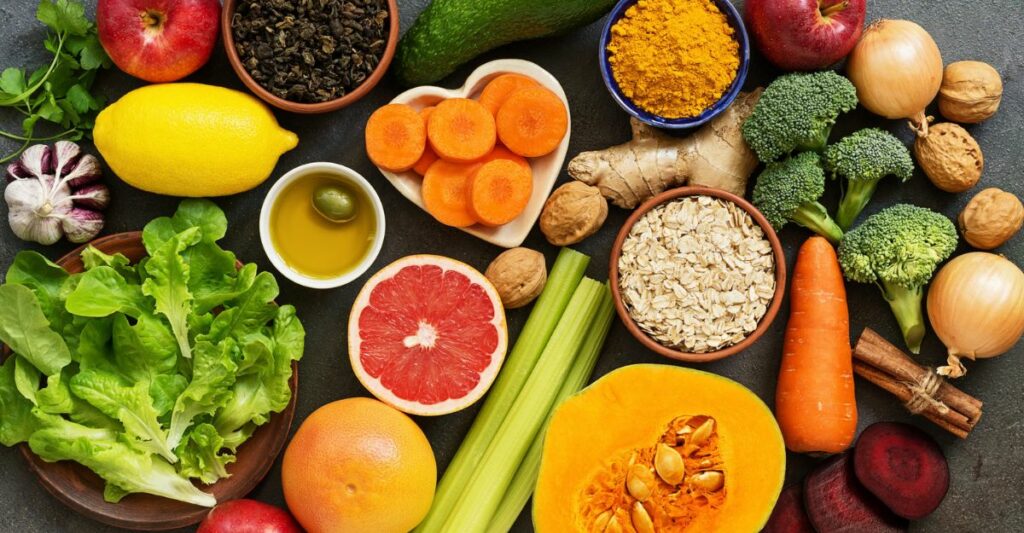Jaundice is a medical condition characterized by the yellowing of the skin and eyes due to the buildup of bilirubin, a yellow pigment, in the body. It can occur as a result of various underlying causes, such as liver disease, hepatitis, or blockage of the bile ducts. While medical treatment is necessary for jaundice, adopting a suitable diet can also play a significant role in supporting liver function and promoting recovery. In this comprehensive guide, we will discuss the foods to eat and foods to avoid when dealing with jaundice.
Foods to Eat:
- Fresh Fruits and Vegetables: Incorporating a variety of fresh fruits and vegetables into your diet is crucial for jaundice patients. These foods are rich in vitamins, minerals, antioxidants, and fiber, which aid in the detoxification process and support liver health. Opt for fruits such as oranges, berries, and papayas, and vegetables like leafy greens, broccoli, and carrots.
- High-Fiber Foods: Consuming foods high in fiber helps regulate bowel movements, preventing constipation, which is common in jaundice patients. Include whole grains like brown rice, oats, and whole wheat bread in your meals. Legumes, such as lentils, beans, and chickpeas, are also excellent sources of fiber.
- Lean Protein: Protein is essential for repairing liver cells and supporting the regeneration process. Choose lean sources of protein, such as skinless poultry, fish, tofu, and legumes. Avoid fried or processed meats, as they can be hard on the liver.
- Healthy Fats: Incorporating healthy fats into your diet can help improve liver function. Opt for sources like avocados, nuts, seeds, and olive oil. These foods provide essential fatty acids, which aid in reducing inflammation and supporting liver health.
- Herbal Teas: Certain herbal teas, such as dandelion root tea and milk thistle tea, are believed to have hepatoprotective properties. These teas may help cleanse the liver and promote its overall health. However, consult your healthcare provider before incorporating any herbal remedies into your diet.
- Plenty of Fluids: Staying well-hydrated is vital for overall health and can support the liver in its detoxification processes. Drink an adequate amount of water throughout the day, and include freshly squeezed fruit juices, coconut water, and herbal infusions to replenish electrolytes.
Foods to Avoid:
- Alcohol: One of the most crucial steps in managing jaundice is avoiding alcohol completely. Alcohol places a significant strain on the liver, hindering its ability to detoxify the body. It can worsen liver damage and delay the recovery process.
- Fatty and Fried Foods: Foods high in saturated and trans fats, such as fried foods, processed snacks, and fatty cuts of meat, should be avoided. These foods are difficult to digest and can exacerbate liver inflammation.
- Spicy and Oily Foods: Spicy and oily foods may cause digestive discomfort and aggravate jaundice symptoms. Avoid dishes that are heavily spiced, deep-fried, or greasy. Opt for milder flavors and healthier cooking methods like baking, grilling, or steaming.
- Refined Sugars and Sweets: Foods high in refined sugars, such as cakes, pastries, candies, and sugary beverages, should be limited or eliminated from the diet. These foods can contribute to fatty liver and inflammation.
- Caffeinated Beverages: While moderate consumption of caffeine may be acceptable for some individuals, it is generally recommended to limit or avoid caffeine when dealing with jaundice. Caffeine can dehydrate the body and place additional stress on the liver.
- Processed Foods: Processed foods often contain artificial additives, preservatives, and high levels of sodium, which can strain the liver and impede its detoxification processes. Opt for fresh, whole foods instead.
- It is essential to note that individual dietary requirements may vary based on the underlying cause and severity of jaundice. Consult with a healthcare professional or a registered dietitian to receive personalized dietary recommendations.
Conclusion:
When dealing with jaundice, adopting a well-balanced diet is crucial for supporting liver function and promoting recovery. Focus on consuming fresh fruits, vegetables, high-fiber foods, lean proteins, healthy fats, and herbal teas. Additionally, stay well-hydrated by drinking plenty of fluids. On the other hand, avoid alcohol, fatty and fried foods, spicy and oily foods, refined sugars and sweets, caffeinated beverages, and processed foods. Remember, a healthy diet, combined with appropriate medical treatment, can contribute to a faster and smoother recovery from jaundice.

